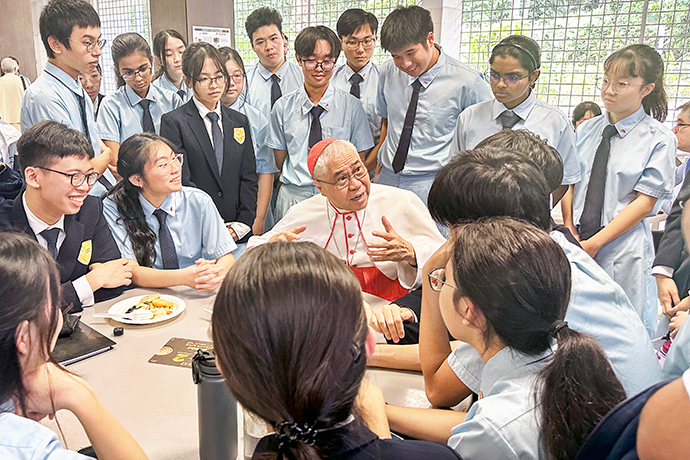In a rare and candid exchange, Cardinal William Goh sat down with students of Catholic Junior College (CJC) during the institution’s golden jubilee celebrations, engaging in a free-flowing dialogue in the school canteen that spanned a wide range of personal and pastoral topics.
The conversation offered students a glimpse into the life and thoughts of Singapore’s first cardinal, who spoke openly about his faith journey, leadership challenges, and daily routines, according to Catholic News SG, the official news site of the Church in Singapore.
When asked about his episcopal motto, Ut vivant, Cardinal Goh explained that the Latin phrase, meaning “that they may live,” is drawn from the Gospel of John 10:10.
“My whole life is given to the people of God. What gives me life is when I give life to others,” he said. “Whether you do well [in your studies] or have a great career, all these will be meaningless if they are only about yourself. It is when we use our talents and resources for the service of others that we find interior joy.”
Describing the mission of his vocation, Cardinal Goh said his role as a bishop and priest is to bring life to others in ways they are able to receive—offering Jesus to those with faith, and love, acceptance, and understanding to those without.
His aim, he said, is to empower others, give hope, and help people discover their full potential, calling, and happiness.
In response to a student’s question on whether being a cardinal is fun, Cardinal Goh replied, “Well, it depends on what you mean by fun, but it is certainly interesting and enriching.” He added that the diversity of people he interacts with—from politicians to youth—makes his life “very rich” and that these encounters energise him.
On his daily schedule, Cardinal Goh shared that he starts his day at 4 am with an hour of exercise, during which he also reflects and prays, as many ideas and insights come to him at that time.
He then spends another hour in prayer before writing his homily and reflections for the day. His mornings and afternoons are filled with meetings, and he celebrates Mass and prays with his staff at noon.
His day usually ends at 7.30 pm, though it can extend to 10.30 pm if there are evening events or masses.
When a student asked about his personal best at the gym, he responded, “I don’t take note of such things. You need to love your body, but not for vanity.” He emphasized health over appearance, remarking,
“For me, there is only one good reason why we exercise – to keep ourselves healthy so we can serve people and not have to spend unnecessary money on medical bills,” he said.
He also reflected on the challenges of leadership, highlighting the COVID-19 pandemic as the most difficult period of his episcopacy.
Faced with a wide range of opinions from medical professionals and others—some urging the suspension of Masses to protect the vulnerable, others advocating for continued services as an act of faith—he made the decision to halt public liturgies.
He stood by that choice, saying it was made with a clear conscience and rooted in a sense of responsibility, even if it wasn’t the best decision for everyone.
To critics, he was forthright: “If you don’t like my decision, remove me!” he said. “I don’t have to be a bishop or cardinal to be happy. In fact, I was happier as a priest because I was able to minister to the people.”
On the topic of vocation, Cardinal Goh spoke of his own discernment. “When I was in Secondary One, I wanted to be a priest… when I started working in a bank, the call became stronger, and I could not deny it anymore.”
He stressed, “You need to find your vocation because if you don’t live out your vocation, you will not be happy.”
A lighter moment came when a student asked if he had ever had a girlfriend. Cardinal Goh replied, “I had many friends who are girls, but not a girlfriend.”
He emphasized the value of friendships across genders, noting, “A woman’s emotions and views help to mould and sharpen us so we are more holistic.”
He concluded by emphasizing that both vocation and leadership must be grounded in a commitment to serve, rather than pursued for status or recognition.







